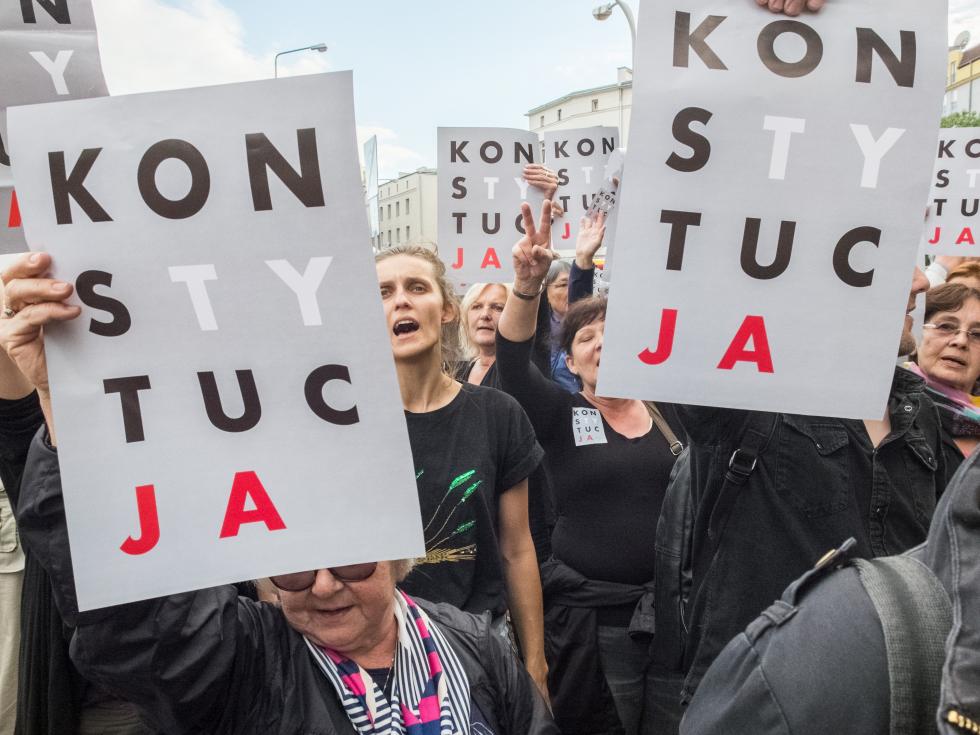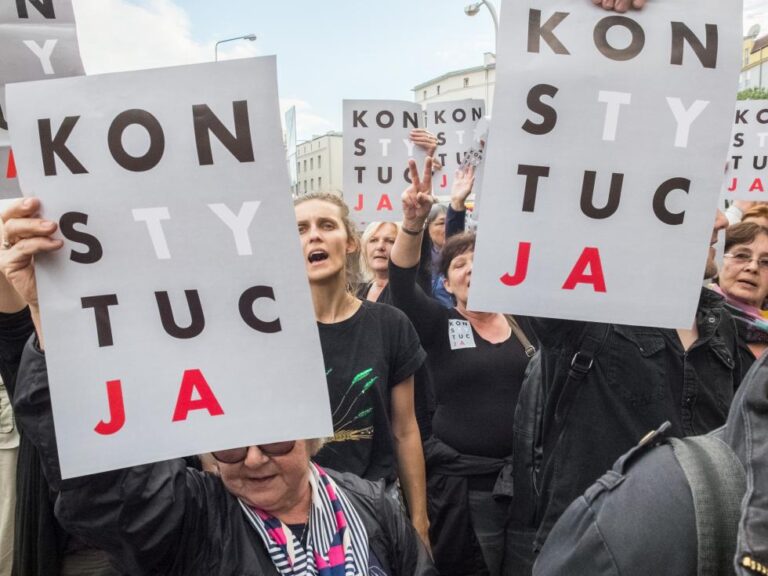The Polish ruling Law and Justice party (PiS) is close to taking control over the country’s Supreme Court. That might mean giving the politicians an opportunity to change the sentences from the last 20 years, to punish independent judges and the media and to decide on the validity of future elections. That can be stopped only by the Court of Justice of the European Union, but the time is running out quickly.
blog post by Daniel Flis [oko.press]
Law and Justice has been consistently taking more and more control over the Polish judicial system. Just after the parliamentary elections in 2015, PiS started systemic changes by taking over the Constitutional Tribunal, where – breaching the constitutional provisions and ignoring the Court’s rulings – they introduced three judges to the posts that were already held by other judges and appointed Court’s new president.
In early 2016, the party subordinated all prosecutors to the Minister of Justice. In 2017, the Minister (who is the Prosecutor General at the same time) gave himself the right to exchange the heads of common courts, which he immediately did.
In early 2018 the Law and Justice shortened the tenures of most of the judges at the National Council of the Judiciary, although they were guaranteed by the constitution. The Council is responsible for, among others, appointing and promoting judges. The new members of the body were elected – again, unconstitutionally – by the Members of Parliament, not by the judiciary.
In order to close the control system over the judiciary, PiS still needs to introduce its people to the Supreme Court and the Supreme Administrative Court – the highest court instances in the Polish judiciary. Therefore, they passed a law allowing the removal of judges aged over 65, including – among others – the presidents of those courts who were supposed to serve in the office for six years, as stated in the Constitution.
PiS also established new “political” chambers of the Supreme Court: a disciplinary chamber, which will be able to punish and even dismiss legal professionals, and a chamber for extraordinary supervision and public affairs, which will deal with appeals against judgments made in the the past 20 years and will approve the results of elections and referendums, and matters relating to competition protection, energy regulations, telecommunication and more.
The Law and Justice already has some gains from the changes, mainly – impunity of party members. The prosecutor’s offices discontinued investigations into the abuses of Law and Justice politicians, and the Constitutional Tribunal, also fully under party’s control, has declared the constitutionality of clearly unconstitutional provisions.
So what is happening at the moment? What kind of changes are going to be established? The seizure of the Supreme Court and the Supreme Administrative Court will provide real tools for harassing political opponents and media that are not in party’s line, and even for manipulating election results. Institutions subordinate to the Law and Justice have already initiated proceedings which may result in imprisonment of politicians and journalists, financial penalties for the media, withdrawal of concessions and additional taxes on non state-owned TV and radio stations. Until now, however, most of these concepts have been only threats.
For the time being, nothing has been decided yet. Polish judges and the European Commission have been defending the Supreme Court. Małgorzata Gersdorf, the President of the Supreme Court, announced that she would not resign before the end of her term in 2021. The European Commission launched procedure against Poland under Article 258 of the Treaty on the Functioning of the EU, which could lead to the Court of Justice of the European Union (CJEU) challenging the new Polish laws. And a few days ago the judges of the Supreme Court submitted to the CJEU the so-called questions for preliminary ruling, concerning the regulations on removing the judges, and suspended their binding force.
The Court of Justice of the EU might declare the provisions of the new law are incompatible with the EU law and dismiss them.
However, PiS is not taking a step back. On the contrary, it passed a law to speed up the appointment of newly elected judges and announced that the party would not recognize the suspension of the binding rules by the Supreme Court.
It seems that PiS probably wants to appoint the Supreme Court as soon as possible – and before the CJEU judgements – with ‘party’ judges , hoping that there would be no possibility to remove the “new” judges and reinstate the “old” ones. It fits the pattern known from Hungary, where the government also removed the judges in 2011 by lowering the retirement age. Hungary lost cases to the CJEU and the European Court of Human Rights, but the removed judges did not return to their positions.







